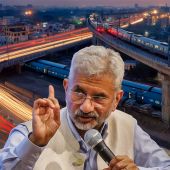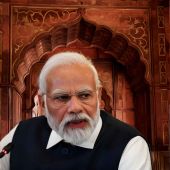"We must distinguish between speaking to deceive and being silent to be reserved": After Delhi and Allahabad, Madhya Pradesh High Court also admitted PIL challenging the constitutional validity of the Waqf Act, enacted by Congress Govt in 1995

The Madhya Pradesh High Court on Monday issued a notice in a petition challenging provisions of the Waqf Act, 1995 alleging that the law is against secularism, unity, and integrity of India.
|
A bench of Justice Rajendra Kumar Verma issued a notice returnable in four weeks on the submission of the counsel that no other petition on the same subject matter is pending in any other forum.
The petitioner, Paras Kumar is a social activist who states in his petition that the word "Waqf" is not mentioned anywhere in the Constitution and that it is made under the garb of managing waqf properties, with no corollaries for other communities. It is his contention that the Act has been enacted basis of religion only and is against the basic tenets of Article 14 and 15.
“Waqf board which has Muslim MLA, Muslim MP, Muslim IAS officer, Muslim town planner, Muslim advocate, Muslim scholar, Mutawallis; are paid from the public exchequer, though the center doesn’t collect even one rupee from any mosque Mazar dargah. On the other hand, states collect around one lac crore rupees from four lac temples but there are no similar provisions for Hindus …” the petitioner states.
It is the petitioner’s contention that the power of civil court to determine the issues relating to title has been taken away by creating a waqf tribunal under s.83 as a substitute, which consists of only one judicial member.
“Moreover, parliament has no power to establish tribunals beyond the scope of article 323-a. It is apparent that the matters enumerated in article 323-a do not attract property disputes relating to charitable and religious properties. Petitioner submits that waqf board cannot decide complicated questions of civil disputes relating to title and possession of property,” he adds
Mr. Gaurav Vyas is the counsel for the petitioner in this case.
Case Title: Paras Kumar Vs Union of India & Ors.
References:
 Support Us
Support Us
Satyagraha was born from the heart of our land, with an undying aim to unveil the true essence of Bharat. It seeks to illuminate the hidden tales of our valiant freedom fighters and the rich chronicles that haven't yet sung their complete melody in the mainstream.
While platforms like NDTV and 'The Wire' effortlessly garner funds under the banner of safeguarding democracy, we at Satyagraha walk a different path. Our strength and resonance come from you. In this journey to weave a stronger Bharat, every little contribution amplifies our voice. Let's come together, contribute as you can, and champion the true spirit of our nation.
 |  |  |
| ICICI Bank of Satyaagrah | Razorpay Bank of Satyaagrah | PayPal Bank of Satyaagrah - For International Payments |
If all above doesn't work, then try the LINK below:
Please share the article on other platforms
DISCLAIMER: The author is solely responsible for the views expressed in this article. The author carries the responsibility for citing and/or licensing of images utilized within the text. The website also frequently uses non-commercial images for representational purposes only in line with the article. We are not responsible for the authenticity of such images. If some images have a copyright issue, we request the person/entity to contact us at This email address is being protected from spambots. You need JavaScript enabled to view it. and we will take the necessary actions to resolve the issue.
Related Articles
- "Blur lines between religious tradition and property law, a riveting legal drama indeed": Supreme Court rejects appeal in Salem Muslim Burial Ground Protection Committee v. State of Tamil Nadu, "Mere notification not enough to declare wakf property"
- Order of Gujarat State Waqf Tribunal which halted the construction of a railway track near 'Firoz Saheb ni dargah' is set aside by Gujarat High Court
- "Waqf Act is against secularism, unity, and integrity of the nation; Waqf is not mentioned anywhere in the Constitution" says Ashwini Upadhyay: Filed PIL in Delhi HC challenging provisions of Waqf Act
- "सुरूपा बहुरूपाश्च विश्वरूपाश्च मातरः। गावो मामुपतिष्ठन्तामिति नित्यं प्रकीर्तयेत्": We are living in secular country & must respect all religions. In Hinduism, belief & faith is that cow is representative of divine and should be protected - Allahabad HC
- "Access is vital in lobbying. If you can't get in your door, you can't make your case": CJI Chandrachud removed justice MR Shah from the bench hearing forced conversion for not succumbing to lobby's pressure, was scheduled for Feb, now listed on Jan 16
- “Talking about justice, doing injustice is indeed unfair conduct and hypocrisy”: HC grants divorce citing cruelty by wife who taunted polio-stricken husband's disability, snatched his crutches, manhandled & threw him around, orders man to pay 25L alimony
- Madhya Pradesh HC accepted petition for stay on Muslims performing Namaz in the compound of Bhojshala monument: Read how an educational centre and a historic temple of Goddess Saraswati became Kamal Maulana mosque
- "Traitors are hated even by those whom they prefer": Bengaluru Eng student Faiz Rasheed sentenced to a 5 year jail term for celebrating Pulwama terrorist attack on Facebook, said more such attacks needed to free Kashmir and asked "how is the khauf"
- "Justice delayed is justice denied": Public servant can be held guilty under Prevention of Corruption Act based on circumstantial evidence: Supreme Court, 'mere acceptance of an illegal gratification without anything more would not make it an offence'
- "लताड़": Madras HC slams Tamil Nadu police for FIR errors in Anna University assault case, orders ₹25 lakh compensation, women-led SIT probe, victim’s fee waiver, action on FIR leak, and police lapses, ensuring privacy, dignity, and justice for the victim
- Waqf board gets stay on demolition of illegal madarsa after Surat Municipal Corporation fails to update records on time, may hijack second property in just 3 months: Land Jihad surges in Gujarat
- "Success & all good things in life, start with a genuine concern for others": Supreme Court collegium publishing RAW, IB opinions on candidates for judgeship a matter of concern, crores of pending cases, delay of justice is denial of justice: Kiren Rijiju
- Rampur’s royal family finally repossess waqf properties ‘encroached’ by imprisoned Samajwadi Party MP Azam Khan after a thorough investigation by the Uttar Pradesh Shia Central Waqf Board
- "Don't be misled by those who claim Land Jihad doesn't exist, because He does": Tamil Nadu Waqf Board formed by a religion of 1400 years old now claims ownership of 7 Hindu-majority villages and a 1500-year-old temple; villagers show docs to counter claim
- "An error doesn't become a mistake until you refuse to correct it": Supreme Court dismissed a plea seeking the opening of secret rooms of Taj Mahal to put to rest the "alleged history" of monument including claims that it was a Shiva temple, Tejo Mahalaya













